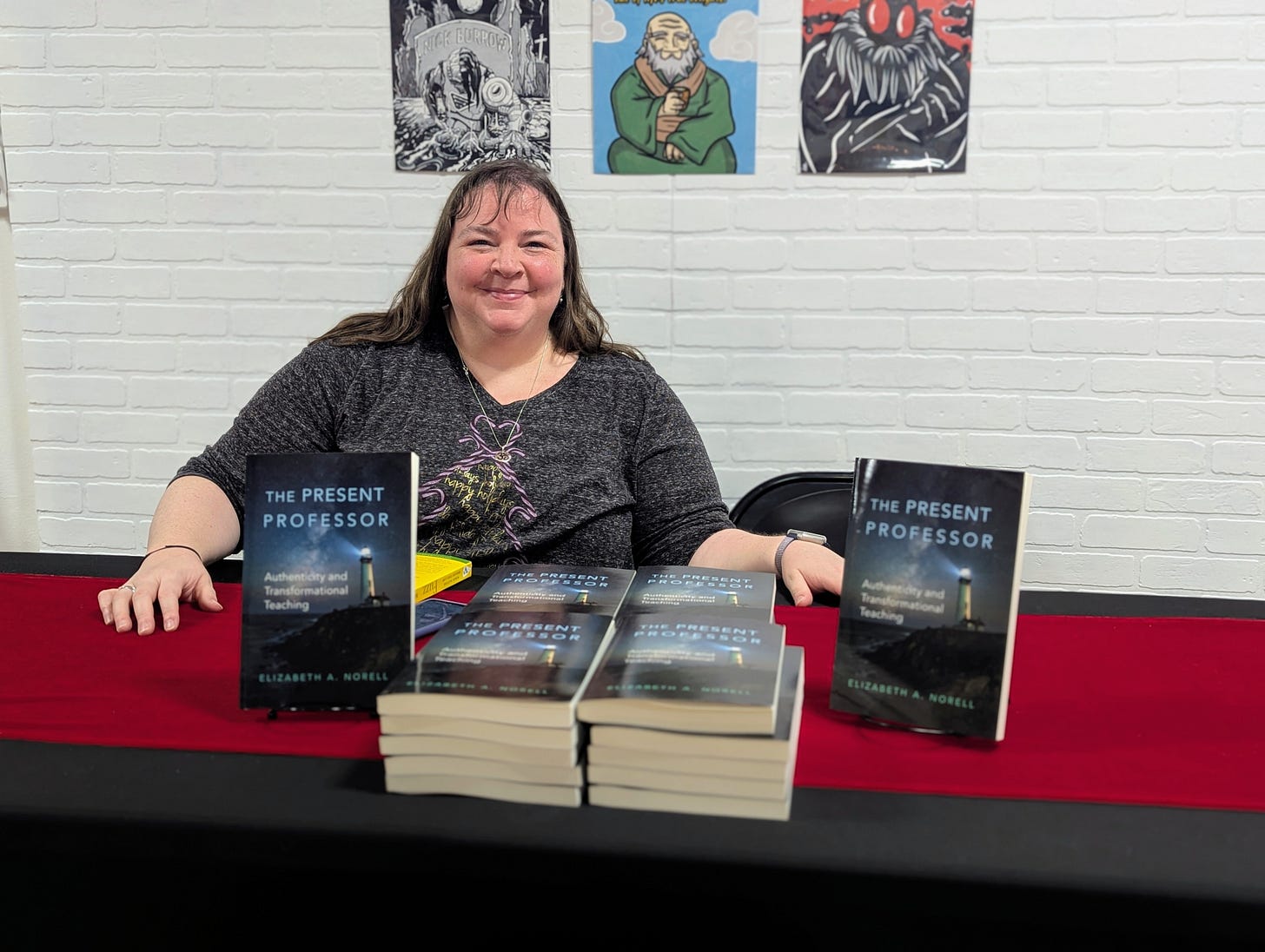The Inauthenticity of Academic Writing Conventions
Or, why I'm no longer interested in forsaking my voice in service of the academy's norms.
Not long ago, I was at a weeklong writing retreat, a gift I give myself when I have the luxury of vacation time and cognitive bandwidth to explore writing. While there, I didn’t have any enormous writing projects demanding my attention. My book was almost out, and while it needed some marketing/publicity attention, I didn’t have a clear picture of what a second book project might look like just yet. Nevertheless, my writing practice is how I make sense of the world and organize my thinking. And right now, I have a lot of things in the higher education space that I’d like to make sense of.
Most pressingly, though, I took to the writing retreat a revise & resubmit (“an R&R,” in academic vernacular1) that was due the week after I returned. It had been languishing on my desk for several months, and every time I thought about it, my shoulders crept up and my whole spirit sighed. Nothing about the piece felt interesting or worthwhile. And if it bored me? There was little chance my efforts to revise my manuscript with the reviewers’ feedback would accomplish, well, much of anything.
Nevertheless, an R&R in a peer-reviewed journal (especially a disciplinary journal!) isn’t something that comes along everyday, and I departed for the retreat committed to rescuing the piece with as little emotional investment as possible. Then I could move on to more exciting ideas.
Exploring the resistance
Because I’ve trained as a coach, I have more than a passing familiarity with feelings of resistance. That’s how coaches describe the friction we experience when we resist doing something we think we should2 do.
Resistance sometimes looks like procrastination. I’ve long been fascinated by the research on why we procrastinate, and recent investigations suggest that we tend to procrastinate on things that feel important and that we aren’t sure we can tackle effectively. We might also procrastinate on things that feel unimportant; a lack of motivation or relevance can lead us to put things off. (See Devon Price’s work for more.)
So as I was preparing to begin work on this R&R at the retreat, I started asking myself why I had procrastinated so long. Why was I feeling so much resistance to revising this manuscript? It was less than 4,000 words long—a pittance for someone who needs a few hundred words to say anything at all. The topic was something I feel passionately about, and yet the idea of revising this piece left me feeling like it might be time for another retreat nap.3
Ultimately, with some reflection on that resistance, I was able to discern that my frustration wasn’t with the topic; it was entirely with the genre.
So, I wrote a book…
Have you heard? I wrote a book!

And here’s the thing: The writing in my book is deeply personal, so much so that one early reader described it as “deeply confessional” and suggested I take a few moments to reflect on whether that’s what I actually wanted out in the world.4 Woven together are strands of narrative and research, all in what I’d describe as my authentic writer’s voice. There’s a whole lot of first-person writing. If you picked up the book and turned to a random page, you’d likely feel somewhat like you were having a conversation with me.
I love that kind of writing. This kind of writing. It feels authentic, approachable, relatable, welcoming.
Academic writing is a genre I’ve mastered through four master’s degrees and a Ph.D. There’s no doubt that I can do that kind of writing.
But after writing a book that felt cathartic, with writing that allowed me to connect with a reader on more than an intellectual level? Writing in the academic genre leaves me feeling cold, inauthentic, and uninspired. I don’t enjoy it anymore.
What’s true for us is true for our students
My guess is that many (most?) of my colleagues, if they felt like they were allowed to write in the voice that feels most relatable and authentic and enjoyable? They’d opt for something like this genre, too. Academic conventions have trained us to distance ourselves from our writing, to divorce our convictions from our arguments—even as we all know that doing so is a total fiction that hides our humanity from one another.
We write academically because we’re told it’s the authoritative way to make forceful arguments. But what if it’s not? What if appealing only to the mind and not the whole human is actually antithetical to everything we know about how humans think and learn?
There’s a lot of evidence5 for the important role emotion has to play in learning. We need to spark curiosity; we need to generate some sense of stakes for our readers. Divorcing our writing from our lived experiences unnecessarily limits our available writerly tools.
And incidentally: One of the reasons students dislike—and hence procrastinate on—college writing is that it’s just… well, not fun. It feels completely divorced from their lives, from any of the kinds of writing they’ll ever need to do outside a college classroom. (I love John Warner’s Inside Higher Ed column, “Writing is Feeling.”) Some of the best first-year writing curriculum designers invest significant time into creating what are sometimes called authentic assignments, or writing/communication projects that have a purpose outside of the course itself, such as a blog, a podcast, an article, a website, a portfolio… the possibilities are limited only by the imaginations of instructors and students.
In other words, the reason I resisted revising my article mirrors the reasons my students tend to put off their first-year writing essays until the last minute: the stakes were high (for me, a peer-reviewed publication; for my students, a substantial portion of their grade) and the motivation was low (because, yawn, this is truly not the writing most people feel inspired to do, absent instrumental goals).
Authenticity matters more
The subtitle of my book, Authenticity and Transformational Teaching, kind of gives away my value commitments, doesn’t it? When I was able to interrogate my resistance and see it for what it was, the choice about how to proceed on the R&R became clearer. Ultimately, investing more than a single day into revising something that felt like an albatross? Well, to paraphrase one of my favorite sayings, I wasn’t put on this Earth to write boring things and do housework.
At that writing retreat, I made a new commitment to myself: Except when absolutely required of me, I’m no longer interested in writing things that feel inauthentic. I’m grateful to have an academic position that doesn’t require me to publish in peer-reviewed journals and other places where inauthentic voice is expected.
I abandoned the R&R. While I was grateful for the invitation to revise the piece, I simply didn’t feel like anything I could produce would fit the expectations of the journal and reflect my writer’s voice. My voice matters, and I want to share it with you—as me.
.
Liz Norell is associate director of instructional support in the Center for Excellence in Teaching and Learning at the University of Mississippi. Her book, The Present Professor: Authenticity and Transformational Teaching, is published by the University of Oklahoma Press in the Teaching, Engaging, and Thriving in Higher Ed series edited by James Lang and Michelle Miller. Follow her on social media @liznorell or on her website at liznorell.com.
One of my co-retreaters, with whom I was once in a small group reading/sharing exercise, understood R&R to mean only “rest and relaxation” and was amusingly confused when I read this draft out loud.
I’m using the word “should” there, but I want to emphasize that it’s almost always the result of us taking on the expectations, real or perceived, of others when we start talking about what we “should” do. For that reason, I dislike talking in shoulds.
I took a nap nearly every day, for the record. Only about half of them were because I was avoiding the R&R.
It is.
For example, see Josh Eyler’s book, How Humans Learn, and Sarah Rose Cavanagh’s book, The Spark of Learning.





Oh my goodness. This was helpful and necessary. I've seen 'plain language' as a key part of my job as an ed dev (taking 'academic/ed speak' and translating it for workshops and discussions), but I've been wrestling with the idea of being a 'scholar' and/or a 'writer' in our field... Inspired by another John Warner missive ("If you want to write a book, write a blog..."), I've approached my blog posts as an experiment in communication and voice - how much research do I link to, how much do I draw from my experience as a student/teacher, and how much do I connect seemingly disparate ideas to make a point about what matters in teaching and learning.
Beyond the absence of ads, one of the things I like about Substack is that finding writers doing the sort of writing you describe seems easier. You can find it in the world of magazines, but there are stylistic and editorial conventions that make many a promising-sounding essay slide into boring thanks to the house style or overzealous editing.
This may be wishful thinking, but the freedom feels conducive to preserving voice.